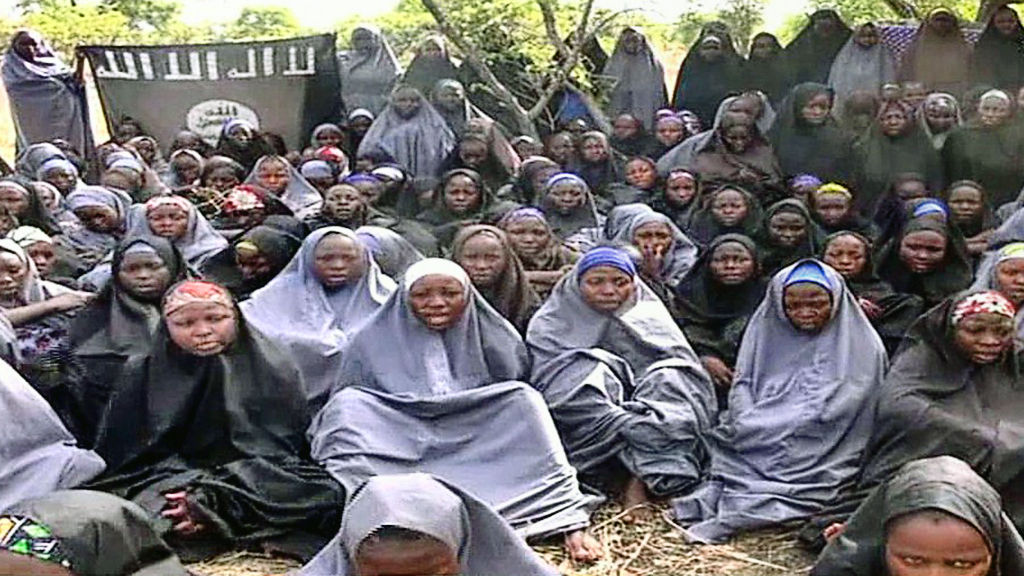Boko Haram Leader Denies Truce, Says Kidnapped Schoolgirls Have Converted To Islam And Married Off
Schoolgirls kidnapped by Boko Haram

NEW DELHI: A few weeks after the Nigerian military declared that it has signed a ceasefire deal with militant group Boko Haram, the group’s leader Abubakar Shekau appeared in a video laughing, declaring that no such ceasefire has been agreed to and that the 200 plus schoolgirls kidnapped by the group in April had converted to Islam and been "married off" long ago.
"We have not made ceasefire with anyone. We did not negotiate with anyone. It's a lie. We will not negotiate,” Shekau says in the video. "What is our business with negotiation? Allah said we should not. The issue of the girls is long forgotten because I have long ago married them off," the Boko Haram leader says, laughing.
Shekau’s appearance comes after the the Nigerian military claimed to have killed him, a claim that they have made several times over. It is possible, as pointed out by the Nigerian Defence spokesperson Chris Olukolade, Shekau has acquired the status of a brand name of sorts amongst Boko Haram rebels, and it is possible that multiple leaders have gone by that name.
The video also comes after Boko Haram went on a rampage killing dozens of people in Nigeria’s northeast -- the first indication that the ceasefire declared by the Nigerian government was unilateral.
Boko Haram as waged an insurgency in Nigeria since 2009, catapulting to international limelight with the kidnapping of the 200 plus school girls. Although a few girls managed to escape, most are still held by the militants, with an initial video saying that the girls will only be released if all the group’s prisoners being held by Nigerian authorities are freed in return.
This incident, along with other reports of violence perpetrated by the militant group, were projected in international media as examples of Islamic terror, with little context specific to Boko Haram being mentioned. As most conflicts that are seemingly religious in nature, the agenda of Boko Haram is outrightly political. The group’s aim is to overthrow the country’s government and seize power. As part of this agenda, the group has adopted a specific variant of Islam - one that is opposed to any political or social activity associated with western society. This includes voting in elections, wearing western clothes and receiving what is considered a western (non religious) education.
The origins of Boko Haram, the official name of which is Jama'atu Ahlis Sunna Lidda'awati wal-Jihad, which in Arabic means "People Committed to the Propagation of the Prophet's Teachings and Jihad", sheds light on the specific social-economic context that has determined developments. As parts of Nigeria fell under British control in 1903, locals came to view western education with suspicion, and this resistance continued as Nigeria gained independence, with many muslim families refusing to send their children to government run “western schools.” The problem was compounded by the lack of priority given to education by the state government.
Located in this context, in 2002, Muslim cleric, Mohammed Yusuf, formed Boko Haram in Maiduguri with the intention of setting up a religious complex, which included a mosque and an Islamic school. Many families across Nigeria and the region enrolled their children in Yusuf’s school. The movement did not remain restricted to education, with the eventual aim of an Islamic state being conceived within the struggle for power that was rooted in an anti-western discourse. In 2009, the group carried out a series of attacks on official buildings in Maiduguri. The group was defeated and Yusuf was killed, but fighters regrouped and in 2010, attacked a prison in Bauchi state, setting free hundreds of the groups’ supporters.
Since then, the group’s attacks have increased in severity, with some of the worst attacks being the 2011 Christmas day bombings on the outskirts of Abuja and in Damaturu; bombing the police headquarters and the UN headquarters in Abuja in 2011; and an attack on a military barracks in Abuja in 2010.
The context is far more complicated than a mere religious rendering can do justice to. Nigerian American author and columnist offered a voice of reason when he tweeted: “I understand the impulse to "do something." But Boko Haram is irreducibly complex. Makes Kony look like child's play” and “The history of the Nigerian military "doing something" about Boko Haram has been one of mass murder of civilians.”
The threat posed by Boko Haram is not going to disappear by launching an offensive attack, which, at best will cause a temporary lull of activity till the fighters regroup and hit back even more violently. The solution to the threat is in reducing the region’s chronic poverty and building an education system which gains the support of local muslims - measures which are not being given priority to by the establishment and figure no where in the “do something” position adopted by the west.



